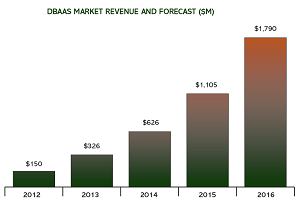News
Mobile, Web Devs Getting More Database-as-a-Service Options
- By David Ramel
- July 28, 2015
You don't see many developers get excited about working with connection strings, database configuration parameters, JDBC drivers and the like.
As nearly all developer products are seemingly getting turned into "X-as-a-Service" offerings, Web and mobile coders are enjoying a growing universe of options from vendors large and small for easily hooking up their apps with back-end databases.
On the large end of things, IBM is bolstering its existing Database-as-a-Service (DBaaS) solutions with the recently announced acquisition of Compose Inc.
Compose is a 2010 startup backed by funding from Y Combinator, which produces the popular development-oriented Hacker News site. The Compose DBaaS provides five open source, auto-scaling databases -- MongoDB, Redis, Elasticsearch, PostgreSQL and RethinkDB -- on its "containerized" platform, which the company says enables fast deployment and easy, automated scaling.
Joining IBM's Cloud Data Services portfolio, the Compose DBaaS will be part of IBM Bluemix, a cloud platform for building, running and managing apps and services, based on open standards.
"Compose's breadth of database offerings will expand IBM's Bluemix platform for the many app developers seeking production-ready databases built on open source," said IBM exec Derek Schoettle in a statement last week. "Compose furthers IBM's commitment to ensuring developers have access to the right tools for the job by offering the broadest set of DBaaS service and the flexibility of hybrid cloud deployment."
That focus on developers was apparently part of Compose's attraction to IBM, according to a blog post written by the startup's two founders.
"IBM really likes how we sell to developers, it's a big part of why they found us intriguing in the first place, Kurt Mackey and Jason McCay said.
Part of what they sell to developers includes the Compose Transporter add-on, which the company says helps developers move data between its database services and Elasticsearch, the Lucene-based search server.
The Compose technology will join IBM's current data-related offerings in the Cloud, including Cloudant, a distributed DBaaS "best suited for applications that need a database to handle a massively concurrent mix of low-latency reads and writes" announced last year.
 [Click on image for larger view.]
The Growth of DBaaS (source: 451 Research)
[Click on image for larger view.]
The Growth of DBaaS (source: 451 Research)
Toward the smaller end of the vendor scale from IBM is Clusterpoint, a Latvian company that last month announced it was entering the North American market with its Clusterpoint 3.0 service and opening a server cluster in Dallas. Clusterpoint 3.0 is a cloud-based NoSQL service "for developers and small to medium size businesses worldwide that want instant scalability and massive distributed computing power for their growing database needs but without the hefty price tag."
The product's pay-per-use pricing model is a major selling point for the company, according to a news release. "In addition to delivering instant scalability and massive distributed computing power in the form of a cloud-based database, developers benefit from a truly unique pricing model that is appealing to individual developers and those at SMBs," the company said. "Clusterpoint 3.0 offers a true pay-per-use model, disrupting the tiered pricing model of today's traditional DBAAS offerings. No other DBAAS company charges in this manner."
The company said that in addition to its Clusterpoint Cloud service, it offers an on-premises solution that runs on Red Hat Enterprise Linux, SUSE Linux Enterprise Server, Centos, Debian, Fedora and OpenSuse.
"Our mission is to accelerate computing and the database plays a very central role in computing infrastructure today," said CEO Zigmars Raascevskis. "Developers who are maintaining their own databases face two major obstacles because of hardware: fixed capacity and speed limitations. This is why we have built a cloud-based database service. In the cloud, the developer's database request can be distributed among hundreds of servers in parallel, significantly reducing clock time to get a result."
Beyond straight database services, developers are also getting more expanded options for their data-related work, including Apache Hadoop-based solutions. Last week, AtScale Inc. announced its business intelligence (BI) technology was being added to the HDInsight service in the Microsoft Azure cloud. HDInsight
"The AtScale Intelligence platform is one of the first solutions to enable the most common BI tools to interact natively with Hadoop without compromising data fidelity or performance," the company said. "When companies deploy AtScale, business users can run reports across billions of rows, at top speed, from the tools they already know, such as Microsoft Excel and Microsoft Power BI."
That announcement comes a couple months after SQL Server kingpin Microsoft beefed up its own straight DBaaS solution, Azure SQL Database, with "elastic" capabilities, and announced a preview of its new Azure SQL Data Warehouse.
IBM just yesterday announced it was following suit with its own cloud data warehouse offering, unveiling IBM dashDB Enterprise MPP, described by the company as a fully managed, high-performance data warehouse service. "One of its key features is making data small in size -- with state-of-the-art compression technology, dashDB MPP can deliver an impressive storage saving to maximize both business value as well as query performance," IBM said.
IBM noted the cloud database market is expected to grow to $14 billion by 2019. "Driving this popularity among developers is the ability to make Web and mobile applications easy to build and grow, without the distraction and monotony of back-end database and systems administration," Big Blue said.
With today's plethora of data options in the cloud -- and more continually coming onboard -- developers are finding more ways than ever to alleviate that distraction and monotony.
About the Author
David Ramel is an editor and writer at Converge 360.